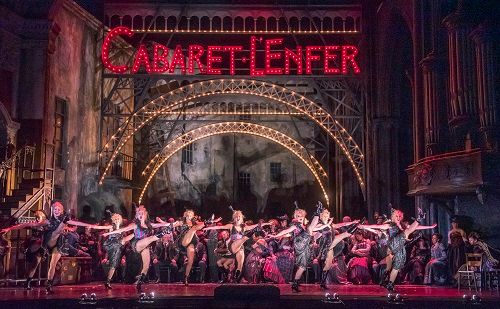A Devilish Pact: Gounod's Faust from the Royal Opera
A performance and staging that never fails to stimulate

There's always the question of, when one gets to know an opera for the first time from video, which staging should one opt for? Traditional yet interesting might be the safest bet; Debussy's Pelléas set on a spaceship might not give the firmest foundation, for example (there nearly was one, incidentally, and the spacehip nearly landed at Glyndebourne; hint: instead, we got Jesus carrying a lamb). David McVicar's Faust at the Royal Opera is just such a tried-and-tested production, with its brilliant usage of space and its clear adherence to the story. Here's the Royal Opera trailer:
A figure of the crucified Christ hangs over the first act, against which "Satan leads the dance"; juxtapositions are stark and effective. The staging is dark, but not oppressive; this is about the battle between dark and light, after all, and the Devil gets tons of good tunes. The Fourth Act church setting is stunning, Méphistophélès and his (danced) demons incredibly powerful (as are the religious choral interjections). A fabulous "Cabaret l'enfers"("L'enfers" - Hades/Hell) features; there is a real feeling of extravaganza about this, but it all has a point. It acts in high contrast to the moments of great interior emotion or reflection.

Faust's pact with the Devil is famous far and wide. One wonders if it cast its shadow over this particular run, as the story attached to my online review at the time shows: originally, Marguérite was to have been sung by the Queen of Cancellations, Anna Netrebko. She, well, cancelled, and a big name was required - step forward Diana Damrau., who also then pulled out. It was left to the Marguérite on this DVD to take over, Irina Lungu. As you can see from the review, for the performance I attended, Lungu had also cancelled and on that occasion, at just a few hours' notice, Mandy Friedrich took over - she was coached on the production in the taxi from the airport to Covent Garden. Suspicious, huh?
That said, that performance was a triumph; as is this one. Conductor Dan Ettinger paces the performance expertly, honouring the frothy numbers, giving the singers space when required, all while ensuring the Royal Opera orchestra is on top, pin-point form. Crowd/chorus scenes are fabulously exciting.
Michael Fabiano is excellent in his role of Faust; we feel his internal struggles, his every emotion as he says farewell to his "final morning" before he takes the potion that makes him master of his own destiny, and his love scenes with Marguérite are gorgeously lyrical. An impassioned "Salut demure, chaste et pure" is particularly memorable.
Erwin Schrott as Méphistophélès commands the stage with his every gesture and utterance. Here's his second act "Le veau d'or":
Irina Lungu is a superb Marguerite, and it is good to hear here in this performance and experience just how perfectly she is cast. She looks innocent, beautiful and, indeed, sings like an angel. She commands the stage in her long scenes in the third act. and there is real chemistry with her Faust.
Marta Fontanals-Simmons feels like luxury casting for Siebel; she is absolutely captivating and her voice is radiant (remember Classical Explorer's post on her disc with Lana Bode, I and Silence). In fact, all of the smaller roles are cast from strength.
Gounod's work is a masterpiece in its layering of strands, and McVicar always complements that in his insights; a silent girl for innocence, for example, or the magnificence of the ballet music. Documentation with DVDs/Blurays is usually pretty terrible, but the essay that comes with this release, Reflections of Faust by Cormac Newark, Head of Research at the Guildhall, is informative and thought-provoking. It supplements a performance and staging that never fails to stimulate and which, importantly, one can also live with. One for the library!
There's one final aspect: Faust as gateway to the rest of Gounod's output. This Gounod Gala in Paris confirmed just how much there is to enjoy off the beaten track. I'm hoping my next foray into Gounod opéra will take us into just that repertoire ...
